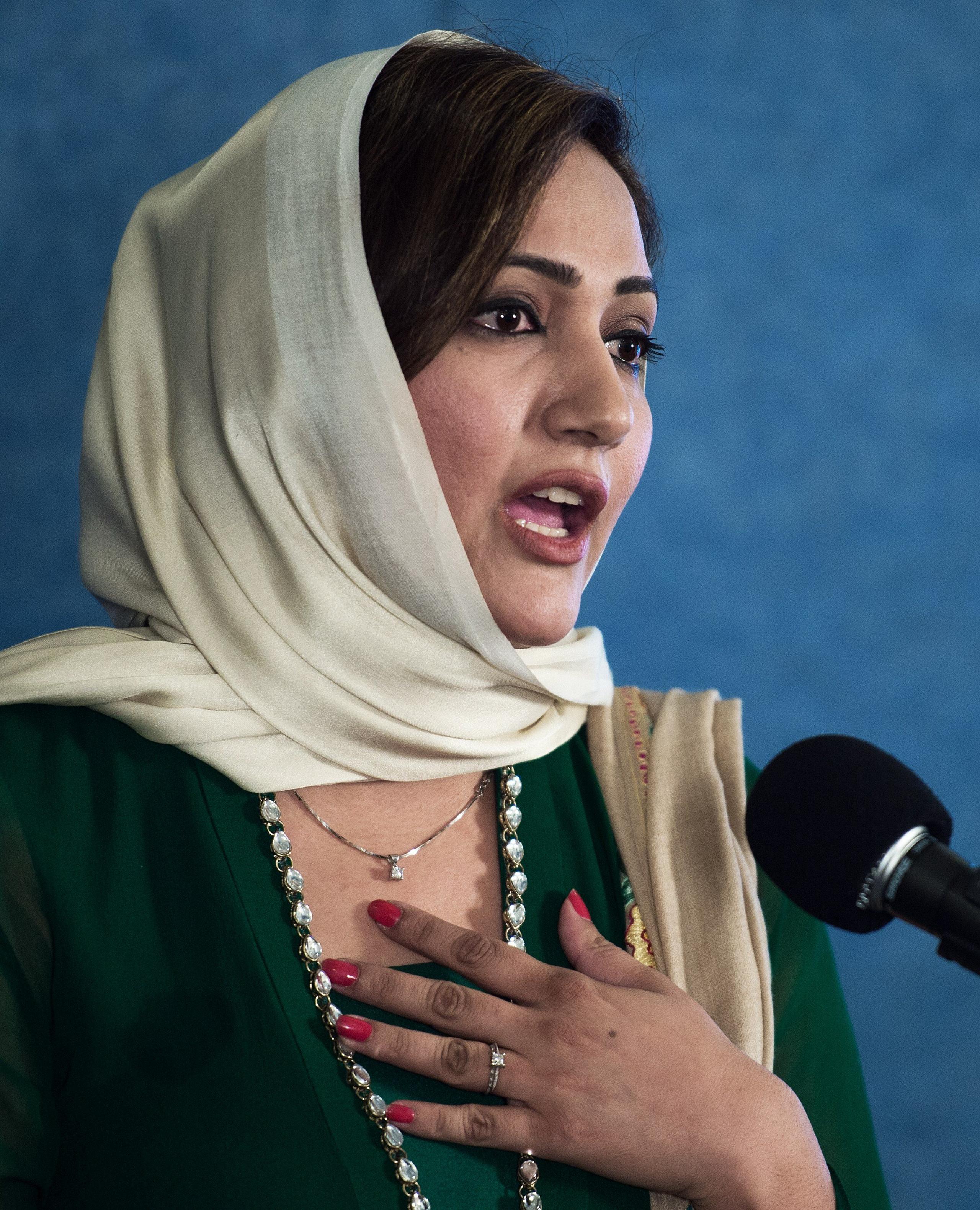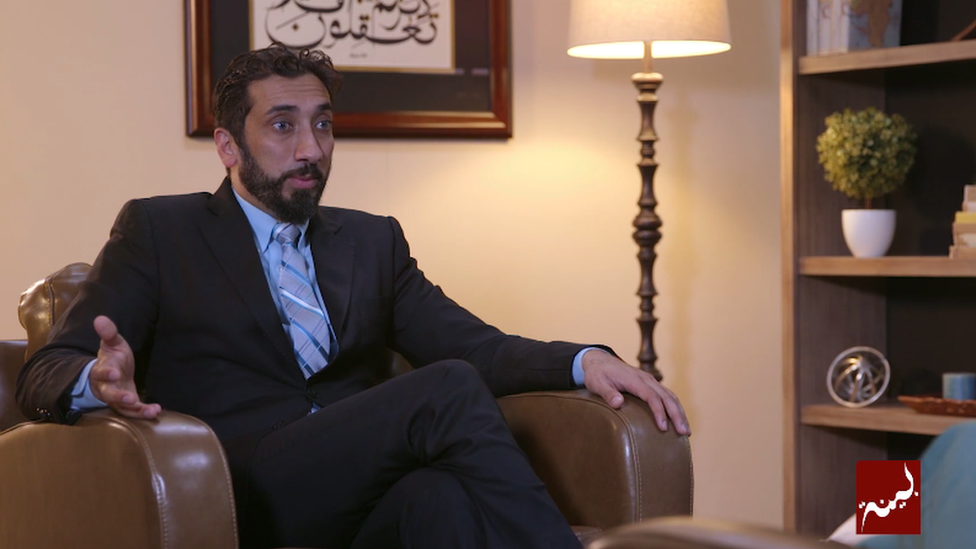The smoking actress and a 'sexist double standard'
- Published

An image of Pakistani actress Mahira Khan and her co-star Ranbir Kapoor smoking went viral, with many taking aim at Khan
Can men get away with things that women can't?
Three stories have become talking points on Pakistani social media channels - sparking questions about double standards and the treatment of men and women online.
In a matter of weeks, images and videos of a Pakistani actress, a Muslim preacher, and a young girl have all shed light on what some have called hypocrisy in Pakistani culture and conservative religious beliefs.
Story one: The smoking actress
Towards the end of September, images of well-known Pakistani actress Mahira Khan were published on a celebrity gossip site. The photos, purportedly from July of this year, showed Mahira Khan smoking outside in a backless dress with an Indian male co-star, Ranbir Kapoor.
Shortly after, the images began circulating on social media, and many people took aim at the actress.
"On social media things went out of control. People were lashing at Mahira Khan about her dress, her smoking, and then a lot of people were angry because she was with an Indian star," says Tahir Imran, BBC Urdu's social media editor.
Within hours, many on the internet had turned on Khan, with some accusing her of insulting Pakistan. But amidst the criticism, there was a chorus of people speaking out in her defence.
Listen to BBC Trending radio on the BBC World Service
One was the Indian actor, Ranbir Kapoor, who appeared alongside her in the viral images.
In a statement, external he wrote: "It is very unfair the way she is being judged and spoken about. What is also sad is the inequality in judgement just because she is a woman."
Another voice who came out in defence of Mahira Khan is prominent Pakistani journalist, Asma Shirazi. Shirazi told BBC Trending that after tweeting her defence of Ms Khan, she herself faced criticism online.
Allow X content?
This article contains content provided by X. We ask for your permission before anything is loaded, as they may be using cookies and other technologies. You may want to read X’s cookie policy, external and privacy policy, external before accepting. To view this content choose ‘accept and continue’.
"When I heard the story and saw it on the top trend I tweeted out in favour of her and pointed out that this is hypocrisy. If some woman is smoking then that is objectionable. If some man is smoking that is not objectionable," Shirazi says.

"This is hypocrisy," says Pakistani journalist Asma Shirazi about the criticism Mahira Khan faced online
She adds: "This is a double standard. They go to cinemas, they watch her movies, they admire her and love to see her naked in movies but can't stand to see a photo of her with a naked back and smoking with an Indian actor."

You might also be interested in:

Story two: The topless preacher
Shortly after the images of Mahira Khan began circulating, another story developed - this time involving a well-known Muslim preacher.
Nouman Ali Khan is based in Texas, and his online videos and institution, Bayyinah, have millions of followers in Pakistan and elsewhere. Known for his conservative viewpoints, Khan disapproves of men and women holding hands in public, has reservations against movies with adult themes, and encourages his followers to marry young.
His reputation came into question after a Facebook post, external by Chicago-based Muslim chaplain Omer Mozzafar said Khan "confessed inappropriate interactions with various women," lied about them, and threatened lawsuits to stop them from exposing him.
According to Navaid Aziz, external, a fellow Islamic scholar, these allegations have nothing to do with rape or sexual assault but are "related to an abuse of power and authority." Within hours, images began circulating online of a topless Nouman Ali Khan, along with allegations that he sent the picture to an unknown female.
In a Facebook post, Nouman Ali Khan noted that he's been divorced for two years, that the pictures were sent to women who he says he was considering for marriage, and that he is "imperfect". Through a lawyer, he declined to comment further to Trending.

Nouman Ali Khan, a popular Muslim preacher, was accused of sending topless pictures to an unnamed woman
Unlike the vitriol aimed at Mahira Khan, online many of Khan's supporters leapt to his defence and, in some cases, hounded those who publicly criticised him.
Laila Alawa, a US-based media entrepreneur, spoke out about Khan's actions, and she says was harassed online because of it - most notably by Khan's female supporters.
"Individuals on the side of Khan began attacking me and finding my personal social media platforms and just going at it," Alawa says. "Seeing that rabid response from his supporters was strange and the fact that a lot of the folks attacking me personally, the most vitriolic of them all were women who believed in him."
According to the BBC's Tahir Imran, the contrast in reactions towards Nouman Ali Khan and Mahira Khan not only points towards a sexist double standard, but also a professional one.
"If he were a film star or a TV actor, things would have been different. But he's a preacher so there is this perception that he's a pious man, so a lot of people were saying these screenshots were Photoshopped."
Story three: blaming young girls
The third story to emerge in close succession has a more sinister undercurrent. A video, which according to Tahir Imran has been shared widely in Pakistan on Facebook and Twitter, shows a young girl allegedly being inappropriately touched by an older man while in a shop.
BBC Trending have not seen the video as it's no longer available in the original tweet it was shared from, and we have not been able to identify the origin of the clip or the man who appears in it. BBC Urdu says that there has been no further information regarding arrests or investigations related to the video. But some of the comments made on the video passed judgement not on the man allegedly inappropriately touching the girl, but on the girl herself.
"A lot of people were saying 'oh, she's not wearing full sleeves, she's not dressed modestly'," says Tahir Imran.
"If you look at the initial reaction that is still there and if we talk very broadly about it, up to 50 or 70 percent of people were objecting to the girl and how she was dressing, rather than saying the contact was inappropriate," he says. At the same time, "there was a huge backlash to that."
One voice that was part of the backlash is Pakistani journalist Shaista Aziz. In a post published online, external and widely shared on social media, Aziz took aim at people blaming the young girl in the video.
"In Pakistan, girls and women must be held responsible for attracting the lustful attention of men, all men, regardless of how old the little girls are," she wrote.
So what, if anything, can be drawn from these three stories?
On the one hand there is a society's attempts to police women and even young girls, and hold them to a standard that's not applied to men, says Tahir Imran. But on the other, there's also a fight back online, with both men and women pushing back against what they see as sexist double standards.
Reporting by Kayleen Devlin and Ritu Prasad
You can follow BBC Trending on Twitter @BBCtrending, external, and find us on Facebook, external. All our stories are at bbc.com/trending.